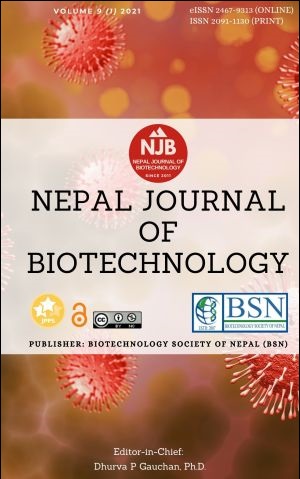Screening of Potential Plant Growth Promoting Properties of Bacillus Species Isolated from Different Regions of Nepal
DOI:
https://doi.org/10.3126/njb.v9i1.38672Keywords:
PGPR, Biocontrol Agents, Plant Growth Promotion, Bacillus, BiofertilizersAbstract
The deleterious effects of intensive use of chemical fertilizers and pesticides in agriculture has led to the substantial research efforts on finding the alternatives to these agrochemicals. This study was aimed to isolate Bacillus species from soil of different regions of Nepal and screen for their ability to promote plant growth directly or indirectly by testing their ability to produce plant growth hormone indole acetic acid, hydrogen cyanide, ammonia and protease as well as phosphate solubilization. Thirty nine Bacillus strains were isolated from 25 soil samples of different regions of Kathmandu and Chitwan districts of Nepal. These isolates were tested for plant growth promoting traits in vitro. Among the total isolates, about 48.7% were indole acetic acid producers, 38.4% of the isolates showed the ability to solubilize the phosphate, 71.8% were able to produce ammonia and all the isolates had the ability to produce hydrogen cyanide and protease. The isolated strains showed positive results to maximum PGPR traits and exhibited a potential to be used as alternatives to chemical fertilizers and pesticides and could be used as low-cost bio-based technology to promote plant growth in the agricultural sector.
Downloads
Downloads
Published
How to Cite
Issue
Section
License
Copyright (c) 2021 Biotechnology Society of Nepal

This work is licensed under a Creative Commons Attribution-NonCommercial 4.0 International License.
Copyright Notice:
The manuscript submitted to NJB must be an original contribution, not previously published and should not be under consideration for publication elsewhere. When the manuscript is accepted for publication, the authors agree to automatically transfer the copyright of the article to the publisher. It should grant permission to any third party, in advance and in perpetuity, the right to use, reproduce or disseminate your article, according to the NJB copyright and license agreement.
Authors transfer copyright to the publisher as part of a journal publishing agreement but have the rights to: Share their article for Personal Use, Internal Institutional Use and Scholarly Sharing purposes, with the NJB applies the Creative Commons Attribution-NonCommercial CC BY-NC license to all the works we publish after Jun 2020 (Before it was CC BY-NC-ND). Under this license, authors agree to make articles legally available for reuse, without permission or fees, for virtually any non-commercial purpose. Anyone may remix, adapt, and build upon your work non-commercially, and although their new works must also acknowledge you and be non-commercial, they don’t have to license their derivative works on the same terms. More details on CC BY-NC refer to its Licence Deed and Legal Code.






